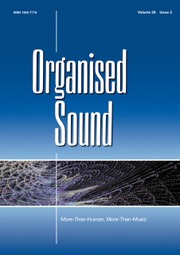Article contents
Acousmate: History and de-visualised sound in the Schaefferian tradition
Published online by Cambridge University Press: 19 July 2012
Abstract
The word ‘acousmatic’ has a strange and complicated history. Recent Schaefferian accounts have replicated François Bayle's sketch of the ‘histoire du mot’ from his Musique acousmatique – in particular, the assumed synonymy between ‘acousmatique’ and ‘acousmate’. However, this synonymy is mistaken. The word ‘acousmate’ was first coined in an article from 1730 to describe a strange noise heard one evening in the small French village of Ansacq. A discussion of the article follows, which shows how the word is unrelated to the Pythagorean acousmatics, and how its author understood his ‘acousmate’ in the context of contemporary natural science. Additionally, a sketch of the term's changing signification in three discourses – scientific, psychological and literary – is presented. The goal of this article is to articulate a set of problems concerning the historiography of acousmatic listening in the Schaefferian tradition. These problems include: 1) the need to authorise a practice of musique acousmatique, which has limited historical investigation to moments where the word ‘acousmate’ or ‘acousmatique’ appear in the archive; 2) a mistaken assumption that ‘acousmate’ and ‘acousmatique’ are synonymous, which has forced together historical moments that are not in fact affiliated; 3) an adherence to this affiliation, which has foreclosed the opportunity to consider acousmatic listening as a set of culturally and historically specific practices concerning the relationship of seeing and hearing.
- Type
- Articles
- Information
- Organised Sound , Volume 17 , Issue 2: Composing Motion: A visual music retrospective , August 2012 , pp. 179 - 188
- Copyright
- Copyright © Cambridge University Press 2012
References
- 1
- Cited by


